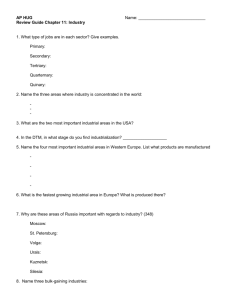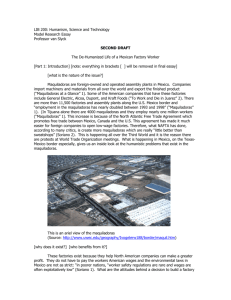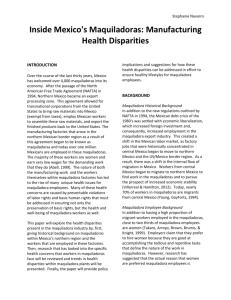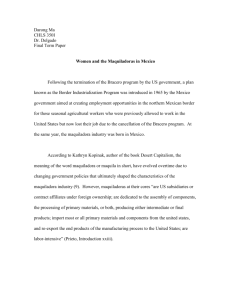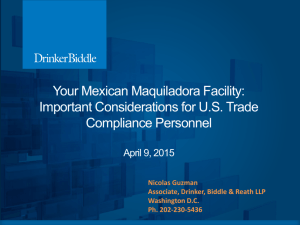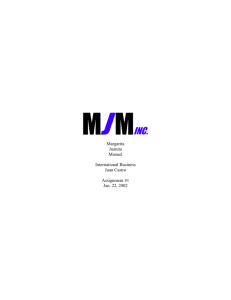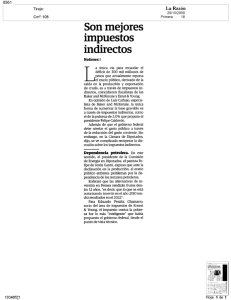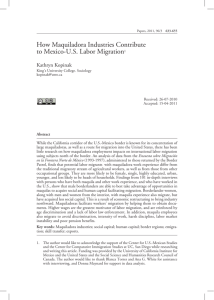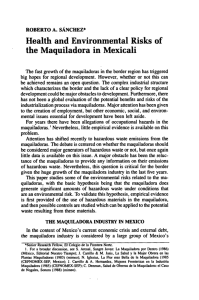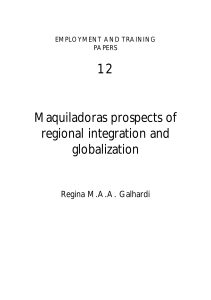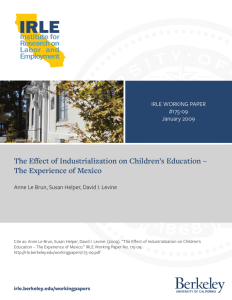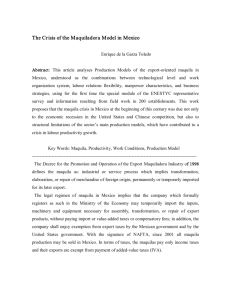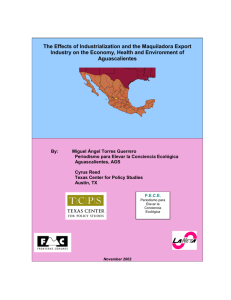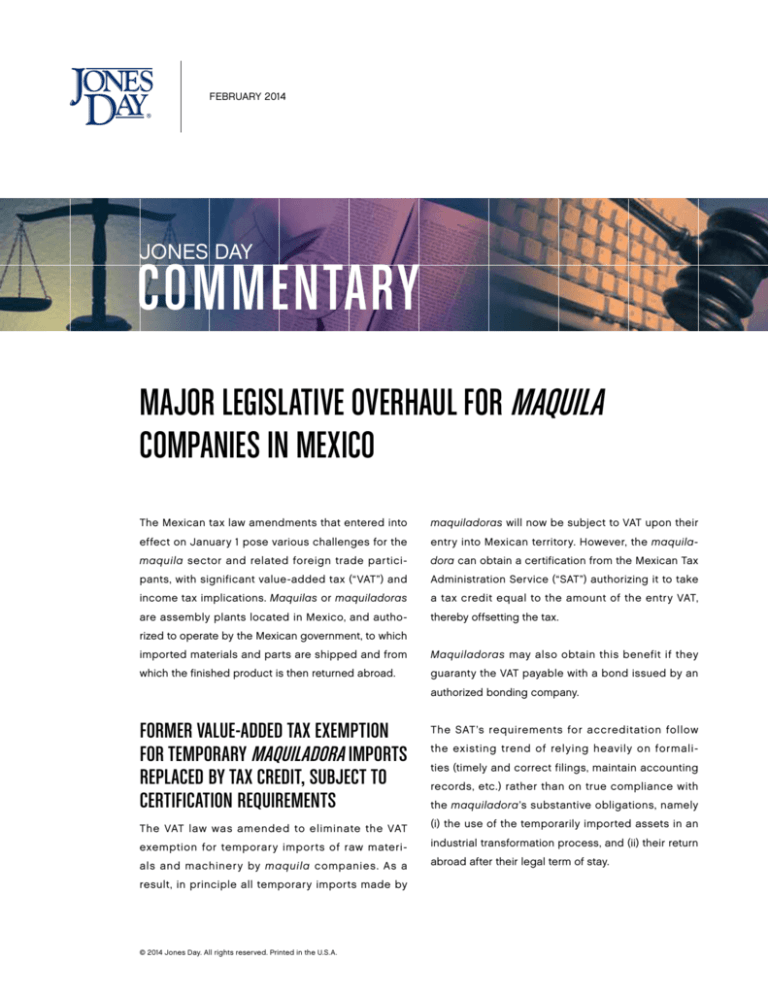
February 2014
JONES DAY
COMMENTARY
Major Legislative Overhaul for Maquila
Companies in Mexico
The Mexican tax law amendments that entered into
maquiladoras will now be subject to VAT upon their
effect on January 1 pose various challenges for the
entry into Mexican territory. However, the maquila-
maquila sector and related foreign trade partici-
dora can obtain a certification from the Mexican Tax
pants, with significant value-added tax (“VAT”) and
Administration Service (“SAT”) authorizing it to take
income tax implications. Maquilas or maquiladoras
a tax credit equal to the amount of the entry VAT,
are assembly plants located in Mexico, and autho-
thereby offsetting the tax.
rized to operate by the Mexican government, to which
imported materials and parts are shipped and from
Maquiladoras may also obtain this benefit if they
which the finished product is then returned abroad.
guaranty the VAT payable with a bond issued by an
authorized bonding company.
Former Value-Added Tax Exemption
for Temporary Maquiladora Imports
Replaced by Tax Credit, Subject to
Certification Requirements
The SAT’s requirements for accreditation follow
The VAT law was amended to eliminate the VAT
(i) the use of the temporarily imported assets in an
exemption for temporary imports of raw materi-
industrial transformation process, and (ii) their return
als and machinery by maquila companies. As a
abroad after their legal term of stay.
result, in principle all temporary imports made by
© 2014 Jones Day. All rights reserved. Printed in the U.S.A.
the existing trend of relying heavily on formalities (timely and correct filings, maintain accounting
records, etc.) rather than on true compliance with
the maquiladora’s substantive obligations, namely
Some of the new certification requirements are cause
Maquiladoras are no longer required to withhold VAT from
for concern. For example, a certified maquiladora will be
the sales by their Mexican suppliers. While this may ben-
required to:
efit the Mexican suppliers, it could affect the cash flow of
smaller maquiladoras.
• Prove that the value of the merchandise transformed and
returned during a given year represents at least 60 per-
Additional Requirements for Favorable
Income Tax Treatment for Maquiladoras
cent of the value of the temporarily imported materials
during the same period.
• File the response to an electronic verification via the SAT’s
electronic system attesting that not only it, but also its
The new tax law amendments also create additional legal
members, shareholders, legal representatives, and sole
requirements for maquiladoras to obtain certain previously
director or board members, are in compliance with their
available income tax benefits. Prior to the amendments,
respective tax obligations.
maquiladoras were deemed not to create a “permanent
• Have the infrastructural capacity necessary to operate
establishment” for their foreign contractor for Mexican
under its specifically approved maquila program. (It is
income tax purposes if certain administrative requirements
unclear whether the SAT presently has the capacity to ver-
were met. With the present amendments, maquiladoras that
ify this. If the SAT denies a certification for this reason, the
wish to preserve this benefit are required to prove, besides
company may not reapply for certification for six months.)
other formalities, that:
• Engage SAT-authorized Mexican or foreign transportation
* All of their foreign material suppliers (other than their main
companies for the movement of temporary imports.
contractor) have a “commercial relationship” with them.
• Reapply for certification if it is the resulting entity in a
* All materials that were not temporarily imported by the
merger or spin-off.
• Notify the SAT of any change in its members, sharehold-
maquiladora are being used together with the temporar-
ers, directors, sole administrator, or legal representatives.
ily imported materials in the relevant industrial process,
• Comply with its social security obligations.
and definitively exported with the temporarily imported
• In case of an audit, evidence the lawful stay in Mexico of
materials.
* The temporarily imported machinery and equipment used
any assets with a value of US$7,500 or more.
to carry out the maquiladora’s operations is owned either
Failure to comply with any of the above requirements will
by it or by its foreign parent. At least 30 percent of this
result in the cancellation of a maquiladora’s “certification.”
machinery and equipment must be owned by the foreign
contractor.
In principle, certification is subject to yearly renewal.
However, maquiladoras with five or more years operat-
Maquiladoras are granted a period of two years to comply
ing under the same authorization, or with machinery and
with the requirement of ensuring that at least 30 percent
equipment valued at more than US$3.85 million or more
of the machinery and equipment used in their operations
than 1,000 employees, may obtain this certification for two-
is owned by the foreign resident with whom they have a
year periods. Maquiladoras with seven or more years oper-
maquiladora agreement (the foreign contractor). Such
ating under the same authorization, or with machinery and
machinery and equipment may not have been previously
equipment valued at more than US$7.7 million or more than
owned by the maquiladora or a related party.
2,500 employees, may obtain this certification for threeyear periods.
2
Certain additional income tax benefits are provided for
maquiladoras:
• They are allowed to deduct, in addition to currently existing deductions, an amount equal to less than half of the
wages paid to their workers.
• VAT caused by the sales of temporarily imported goods
that a maquiladora’s foreign resident contractor makes to a
maquiladora may be offset by the maquiladora purchaser
against the amount payable for the tax in monthly VAT tax
returns, which overrides the negative impacts of VAT.
Finally, it also bears mentioning that the benefit consisting
of a reduced 17.5 percent income tax rate for maquiladoras
(and other temporary importers) was repealed. Therefore,
temporary importers must now pay the full income tax.
Lawyer Contacts
For further information, please contact your principal Firm
representative or one of the lawyers listed below. General
email messages may be sent using our “Contact Us” form,
which can be found at www.jonesday.com.
Mauricio Llamas
Mexico City
+52.55.3000.4082
mllamas@jonesday.com
Javier A. Cortés
Mexico City
+52.55.3000.4050
jcortes@jonesday.com
Jones Day publications should not be construed as legal advice on any specific facts or circumstances. The contents are intended for general
information purposes only and may not be quoted or referred to in any other publication or proceeding without the prior written consent of the
Firm, to be given or withheld at our discretion. To request reprint permission for any of our publications, please use our “Contact Us” form, which
can be found on our website at www.jonesday.com. The mailing of this publication is not intended to create, and receipt of it does not constitute,
an attorney-client relationship. The views set forth herein are the personal views of the authors and do not necessarily reflect those of the Firm.

